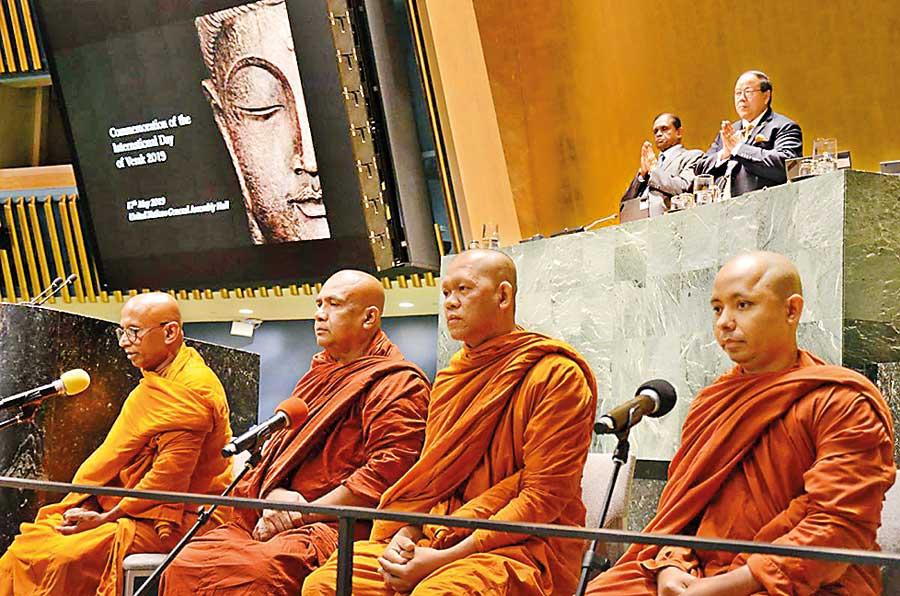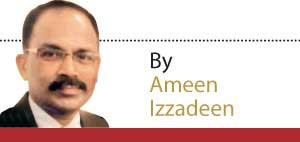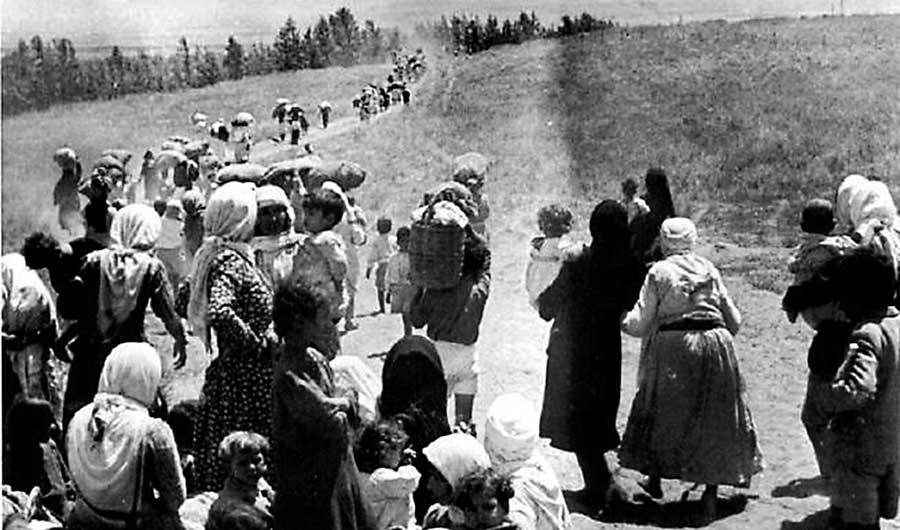05 May 2023 - {{hitsCtrl.values.hits}}

Vesak at the UN headquarters. (Pic courtesy Sri Lanka’s UN mission)
As the United Nations joins Buddhists the world over to celebrate the thrice-blessed Vesak today, there is much energy in the Buddha’s message for the world body to reinvigorate its commitment to maintaining global peace and establishing global justice.
commitment to maintaining global peace and establishing global justice.
The UN charter’s key objectives go with Buddhist precepts. Peaceful conflict resolution, eschewing violence, a morality-based approach to global issues, justice, humanitarianism, and the protection of the environment are part of the Buddhist way of life.
In a message to mark the International Year of Peace (1986), former UN Secretary-General Javier Perez de Cuellar noted that the Buddhist philosophy of peace and the Buddha’s vision that supersedes national and other international differences were essential if the world were to cope with the complexities of the nuclear age. He said the Buddhist philosophy lies at the heart of the UN Charter.
In his Vesak message for this year, UN Secretary-General António Guterres says, “At this time of strife, the Buddha’s teachings of tolerance, compassion, and service to humanity are a source of solace and strength. As we navigate the path to a better future, let us seize the spirit of Vesak.”
Vesak was declared an international day of observance after tireless diplomatic efforts by Sri Lanka’s then Foreign Minister Lakshman Kadirgamar. By its resolution 54/115 of 1999, the General Assembly declared Vesak an internationally recognized sacred day in recognition of Buddhism’s contribution to the spirituality of humanity.
As the key player behind this international feat, Sri Lanka should do much more than be the mere main sponsor of the UN’s Vesak resolution. After all, the country’s constitution calls on the State to protect and promote the Dhamma. Sri Lanka should at least mould its international relations – foreign policy -- in keeping with the teachings of the Buddha. Whether the domestic policy of Sri Lanka’s successive governments has complied with the Dhamma is a question that should be dealt with on another day. But suffice it to say that the call for good governance found in the communique of the International Monetary Fund and donor nations is an indication that there is a Dhamma deficiency in governance. Politics being a power struggle, our politicians are often more Machiavellian than Buddhist.
Foreign Policy, being merely an extension of a nation’s domestic policy, is equally tainted with immorality. It is said that national interest is at the core of a nation’s foreign policy. But when national interest conflicts with morality, Sri Lanka as the prime mover of the UN Vesak resolution is expected to stand by and uphold moral principles in decision-making. In the early years after Independence, Sri Lanka had a principled foreign policy more or less in conformity with the Dhamma. The rise of the Non-Aligned Movement and Sri Lanka’s frontline activism in it augmented the Dhamma-compatible foreign policy.
But alas, today, developing nations’ foreign policies are far from being principled. Most developing countries sell their principles and vote in favour of one powerful nation or another in anticipation of material benefits.
Why blame only poor developing nations? Even some developed nations which claim to take the moral high ground in dealing with global issues are morally bankrupt within. They do not hesitate to misuse the UN mechanism to further their national interest objectives or self-centred political ambitions. World problems remain unresolved and wars continue because of the morally bankrupt foreign policies of some Western nations. Nothing exposes their foreign policy charade more than their response to the Palestinian issue. Their gall to side with oppressor Israel and penalize the oppressed Palestinians, to say the least, is egregious if not nauseating.
After observing Vesak today, the UN will, on May 15, for the first time observe the international day of Nakba – a catastrophe that still resonates in the Israeli-occupied territories of Palestine. Exactly 75 years ago, this week some 800,000 Palestinians were ethnically cleansed after Zionist terror gangs Irgun, Lehi and Hagana raided their villages and shot dead hundreds of unarmed Palestinians for defying the evacuation orders.
In the aftermath of Nakba and the first Arab-Israeli war, the Palestinians looked to the United Nations to deliver justice. The UN appointed renowned Swedish diplomat Folke Bernadotte as its mediator for Palestine. He recognized the injustice done to the Palestinians and tried to work out a fair solution. But he was assassinated by the Zionist terror group Lehi in September 1948 while he was in Jerusalem. The Zionist-controlled media make little or no mention of Folke Bernadotte or Nakba.
Welcoming the UN decision to observe Nakba Day, Palestinian Authority President Mahmoud Abbas has said, “Commemorating the Nakba must be at the top of our priorities to preserve our narrative, which we must adhere to and convey to the whole world.” He urged all Palestinians to commemorate the Palestinian tragedy of 1948 “to confront all lies and false narratives that attempt to distort history and facts.”
Along with the Zionist terror groups, Britain is also equally responsible for the Palestinians’ misery. However ornate tomorrow’s coronation ceremony is and however hallowed the religious chants at the event are, it all sounds hollow if the occasion is not marked by penance for Imperial Britain’s colonial sins. Britain’s wrongdoings include the Balfour Declaration – a product of Britain’s immoral foreign policy.
Millions of Palestinians who are descendants of the survivors of the Zionist terror 75 years ago are living in squalid conditions in crowded refugee camps in the Gaza Strip, the West Bank and neighbouring Arab countries. Every year on Nakba day, Palestinians stage demonstrations, showing the corroding keys of their houses to assert their right to return. If the expulsion of the Palestinians from their villages constitutes a war crime, then denying them their right to return is a continuous war crime Israel is committing with the support of powerful Western nations.
As the UN Committee on the Exercise of the Inalienable Rights of the Palestinian People make arrangements to observe the 75th anniversary of the Nakba, Israel is on a diplomatic offensive to dissuade nations from attending the main ceremony at the UN headquarters in New York. Israel’s hardline Prime Minister Benjamin Netanyahu has said he will personally spearhead the diplomatic campaign to thwart the Nakba commemoration.
If Sri Lanka were to succumb to the pressure of Israel and its all-weather friend the United States, it would amount to the economically bankrupt country admitting to moral bankruptcy also.
Instead, a foreign policy initiative by Sri Lanka during this Vesak week in support of the oppressed Palestinians and the promotion of global justice will be in order. It will be seen not only as a principled, progressive and proactive move but also as a meritorious act compatible with the Dhamma. Since good begets good, a right-is-might foreign policy will certainly serve the national interest of the country.

Nakba 75 years ago. (Pic courtesy WAFA News Agency)
01 Jan 2025 2 hours ago
01 Jan 2025 2 hours ago
01 Jan 2025 3 hours ago
01 Jan 2025 4 hours ago
01 Jan 2025 5 hours ago